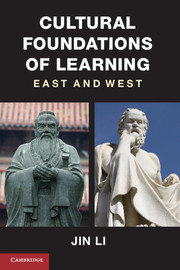Book contents
- Frontmatter
- Contents
- Preface
- 1 Faust and the Birth of a Research Agenda
- 2 Learning to Master the Universe and to Transform Self
- 3 Time Past and Time Present
- 4 Mind-Oriented and Virtue-Oriented Learning Processes
- 5 Curiosity Begets Inquiry and Heart Begets Dedication
- 6 Nerd’s Hell and Nerd’s Haven
- 7 Socratic and Confucian Tutors at Home
- 8 The Devil’s Advocate and the Reluctant Speaker
- 9 Implications for the Changing Landscape of Learning
- Bibliography
- Index
- References
2 - Learning to Master the Universe and to Transform Self
Published online by Cambridge University Press: 05 June 2012
- Frontmatter
- Contents
- Preface
- 1 Faust and the Birth of a Research Agenda
- 2 Learning to Master the Universe and to Transform Self
- 3 Time Past and Time Present
- 4 Mind-Oriented and Virtue-Oriented Learning Processes
- 5 Curiosity Begets Inquiry and Heart Begets Dedication
- 6 Nerd’s Hell and Nerd’s Haven
- 7 Socratic and Confucian Tutors at Home
- 8 The Devil’s Advocate and the Reluctant Speaker
- 9 Implications for the Changing Landscape of Learning
- Bibliography
- Index
- References
Summary
Although many observers of cultures have noted general differences between Western and Confucian philosophy, few have analyzed the differences in learning approaches. The purpose of this chapter is to outline both cultures’ foundational outlooks on learning. By tracing leitmotifs of these different intellectual traditions, I hope to establish the basis for examining and interpreting empirical research findings that will be discussed in later chapters.
A brief review of recorded history reveals that both cultures have rich, long-standing, and influential outlooks, weltanschauung, on learning. Each outlook is an essential part of their respective philosophy. Both outlooks, by the sheer fact that they are distinguishable from one another, can be analyzed as framed by their fundamental questions about learning. These questions have been guiding their thinkers in pursuing their work. Intellectual pursuit resulted in the generation of schools of thought and theories about the world and human life. In response to changing times, later thinkers modified existing paradigms of thinking and developed new ideas. This pattern of idea production continues and is similar in both cultures’ intellectual histories.
- Type
- Chapter
- Information
- Cultural Foundations of LearningEast and West, pp. 20 - 62Publisher: Cambridge University PressPrint publication year: 2012



